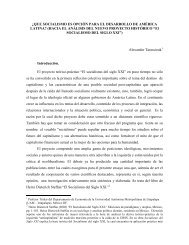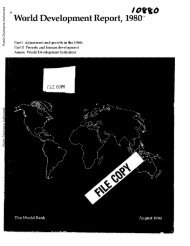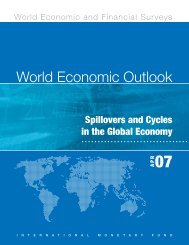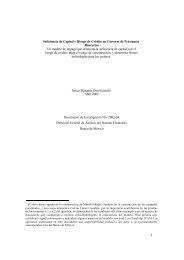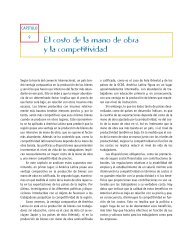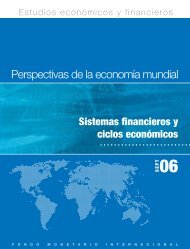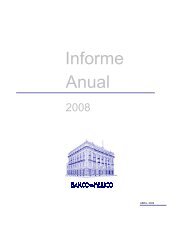World Bank Document
World Bank Document
World Bank Document
You also want an ePaper? Increase the reach of your titles
YUMPU automatically turns print PDFs into web optimized ePapers that Google loves.
agreement has been reached with Ecuador. A similar Year to year reschedulings, whether of official or comagreement<br />
in principle was reached with Venezuela in mercial bank debt, are expensive in the use they make of<br />
late 1984, and an agreement with Brazil is in the the time of senior officials in both developing countries<br />
advanced stages of negotiation. These multiyear agree- and creditor institutions. They also tend to focus attenments<br />
have been implemented for countries that have tion on financial problems to the detriment of policy<br />
made substantial progress in adjusting their balance of reforms. Multiyear arrangements, on a case by case<br />
payments and have credible commitments to future pol- basis, in support of policy reforms are a preferred<br />
icy directions.<br />
approach.<br />
Box 2.5 Recent proposals for dealing with debt-servicing difficulties<br />
Numerous solutions have been offered for the debt cri- process of relending interest by capitalizing interest paysis.<br />
The proposals reflect a range of views about the na- ments. A few proposals advocate new instrumentsture<br />
of debt-servicing difficulties and appropriate such as replacing fixed claims on a country with shares in<br />
responses to them. They include ad hoc financing the country's foreign exchange earnings, or with equity<br />
arrangements; case by case debt reschedulings; interest in state-run enterprises.<br />
capitalization schemes; formal insurance; stabilization * Continuing uncertainty. Any scheme that attempts to<br />
funds; innovative instruments, including equity shares settle the debt problem at a stroke must either reduce the<br />
in public enterprises in borrowing countries as swaps expected burdens on countries so much that a second<br />
with outstanding debt; and comprehensive restruc- rescue will not be needed or make some allowance for<br />
turings, including write-downs or external claims. The future contingencies, such as world recession or higher<br />
objective of these solutions is to permit the resumption interest rates. It must also offer inducements for banks to<br />
of growth and restoration of creditworthiness of devel- keep lending in the future.<br />
oping countries and the restoration of "spontaneous" Several proposals contain measures to deal with uncerlending<br />
by commercial banks. It is not the purpose here tainty, ranging from stabilization funds for fluctuations<br />
to discuss the individual proposals. The proposed solu- in oil prices and interest rates to establishing a formal<br />
tions can best be evaluated by considering four elements insurance scheme to avoid another crisis. It is less clear<br />
that go to the heart of the relationship between debtors how these proposals ensure future lending by banks;<br />
and creditors.<br />
which route is taken has important implications for the<br />
* The distinction between the collective interests of creditors distribution of the burdens and for future access to interand<br />
their individual interests. If the creditors of debtor national capital markets.<br />
countries cannot be paid full debt service, it is in their * Maintaining the solvency of the banking system. Major<br />
collective interest to defer payment-perhaps even to banks hold claims on developing countries equal to sevforgive<br />
part of the payment-rather than provoke a mor- eral times their capital. Any scheme that implies a large<br />
atorium or repudiation by debtors. Individual creditors, write-down of debt must therefore provide for the conhowever,<br />
have an incentive to hold out for repayment, in tinued operation of these banks. Most proposals attempt<br />
effect by being bought out by other parties. Any debt to minimize write-downs, so that banks remain solvent.<br />
reform scheme must provide an answer to this "free Others include the use of official capital to buy part of<br />
rider" problem. Some of the proposals advocate a once- developing-country debt.<br />
and-for-all restructuring of developing countries' debt The current approach, which combines restructuring<br />
into long-term low-interest loans. Most proposals argue of debt service payments with adjustment policies by<br />
that debts should be taken over by a new international debtor countries, has an answer for each of these four<br />
agency and raise questions about the availability of addi- issues. Abstracting from important details, it deals with<br />
tional official capital for this purpose.<br />
the free rider problem through ad hoc pressure and sua-<br />
. Limits to debt service. Debtor countries have now sion on banks; it relies on conventional reschedulings to<br />
shown their ability to run big trade surpluses to service reduce the interest burden by relending; it copes with<br />
their debt. For some countries, at their present levels of uncertainty by keeping the banks involved, and theredevelopment,<br />
it may be difficult to keep running trade fore it preserves the ability to demand additional loans<br />
surpluses large enough to pay all interest, particularly if from existing creditors; and it copes with the solvency<br />
interest rates rise. So a feasible debt reform plan must problem by avoiding write-downs. So far this approach<br />
not only reschedule all principal, in some cases it may has worked better than many had expected. However,<br />
also have to reduce the current interest burden. wider use of mnultiyear debt restructurings on a case by<br />
In order to reschedule principal, most proposals sug- case basis as a part of an overall financial package supgest<br />
that bank loans should be converted into some other porting stabilization and adjustment, particularly in sublong-term<br />
asset, particularly long-term bonds. To reduce Saharan Africa, will help to alleviate debt-servicing diffithe<br />
burden of interest payments, some proposals argue culties.<br />
for relending interest; others suggest an automatic<br />
29




